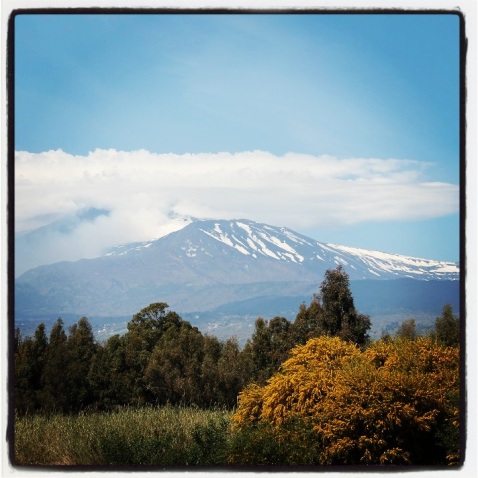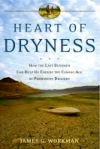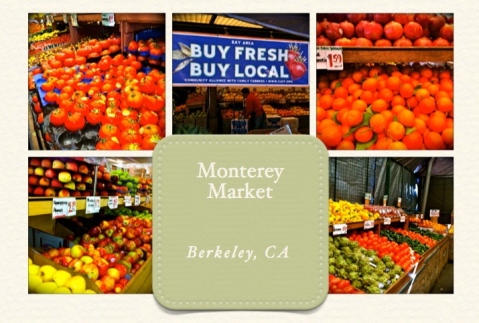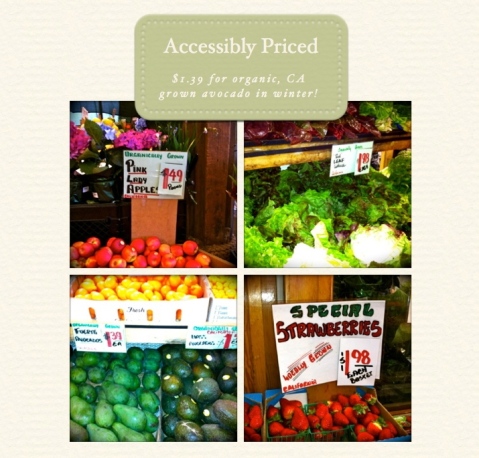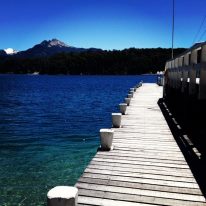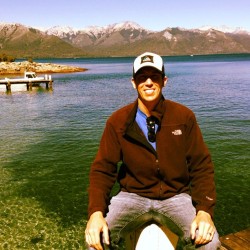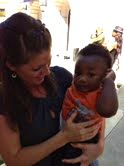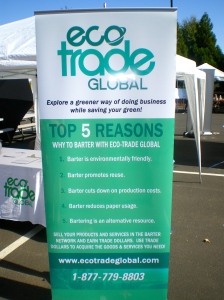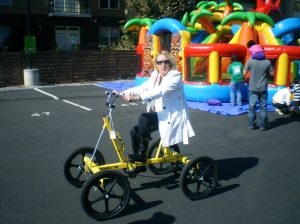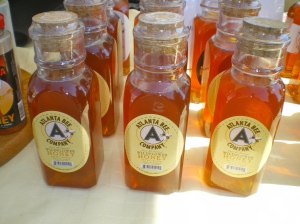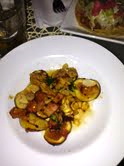Johanna in Catania, Sicily! A Global Examination of Over-Consumption Recovery!

Join me in my conversation with Johanna, living in Catania, Sicily! I am enlivened by this snapshot of Johanna’s over-consumption recovery, and I hope that you are too!
A few quick words about why I post “Biocadence International Interviews”: Connecting with global siblings who are making similar behavioral adjustments is a delight that I have particularly benefited from. The support and knowledge can uncover treasures we may not have known to look for, facilitating increased quality of life through living more sustainably!
Johanna of J Siljehagen Green Consulting ~
**Follow Johanna on Facebook, Blogspot, and Twitter
—
- Biocadence: Where do you live? What current events have the most impact on your community? What sustainable living practices are common in your community?
Johanna: I live in Catania, the eastern part of Sicily, just by the foot of the active volcano Etna. I live here mostly for work, to avoid back and forth travelling from where I lived before (by the beach in south Sicily which is also a great area for organic produce). Wait… I do not like to call it work… Let’s call it ”what I love to do”.
Sicily has now started to open up the dialogue about environmental issues and just some time ago inserted recycling and diversing of domestic waste. Additionally, Sicily has many sun parks (solar) and has invested a lot in wind turbines.
- Biocadence: What do you do for a living?
Johanna: I am an entreprenour in the Green Sector. I started exporting organic produce over three years ago and have now developed into other green sectors, like tourism and construction.
- Biocadence: How often do you cook at home versus eat out? Do you know your farmer(s)? Where do you get your food; how much of your food do you grow yourselves? How do you choose your food vendors? Approximately what % of your diet is meat/veggie/grain?
Johanna: We cook at home twice a day, for lunch and dinner, and eat out 1-2 times a week to eat fresh fish the local fishermen bring to the restaurants. Sicilian cuisine is pure and healthy and having fish dishes prepared by a high quality Sicilian chef is life luxury.
I know my farmers because some are connected with export, and we buy locally grown produce from markets and street vendors.
We grow a lot of herbs and spices on the terrace and planted some citrus trees like orange, mandarine and lemons. Unfortunately last season our crop was destroyed by bugs we were not prepared for and did not know how to handle. But now we have a new start and are better prepared.
I choose food vendors by looking at where the food comes from; there are polluted agricultural areas and I never buy products from there. I look for freshness and local food, otherwise I don’t buy it. We eat all food by season; this makes it more fun because dishes change and we get new recipe ideas all the time by testing something new. We do not buy any supermarket foods.
We eat red meat very little- once a month, and chicken/fish 3-4 times a week. We eat veggies every day, several times a day… we eat alot of vegetables and fruit. E.g.: Instead of potato chips, I’d rather eat fennel slices. We eat almost no grain, but a lot of beans, lentils etc.
- Biocadence: How do you refuel your spirit, energy, and optimism?
Johanna: By training my mind to be free. I read a lot of books and follow other  people who have adapted a new lifestyle. You always find something new- a new perspective, a new idea, a new thing to try…
people who have adapted a new lifestyle. You always find something new- a new perspective, a new idea, a new thing to try…
I also avoid negative people, and surround myself with positive people. I have always been an optimist, even when it rains, because after rain comes sunshine and the rain reminds us of that.
- Biocadence: If you could change one thing about humanity, what would it be?
Johanna: Egoism.
- Biocadence: What sustainable living behaviors did you grow up with? What sustainable living transitions have you incorporated into your lifestyle? How do your sustainable living practices impact your quality of life? Why do you engage in them?
Johanna: My family was very picky with food. I was born in Lapland, Sweden, so fishing salmon and picking berries was ”normal” life. I was allowed to eat fast food once a year, when school finished for summer break. My dad had a E-list on the fridge, with all dangerous E ingredients in the food. My parents made bread, soft drinks, fish, chips, etc at home. I do not remember ever drinking Coca-Cola growing up… We were also allowed to participate in food planning and cooking. I think that is very important.
My life quality has increased a lot. My first step was to get rid of things. It was hard but I created a system that worked and sold over 1000 items in the first months. Then, when I moved to Sicily I saw the change in my health from eating pure local foods. Today I do not need medicine for daily headache or stomach problems, because they are gone. I have far fewer wrinkles, cellulite is almost gone, and allergies are gone. I have started to train my mind and have begun to have an incredible amount of peace inside; I no longer worry about the future, the past is gone… I’m learning to live today and see that life has a funny way to create a path and solve things. Do not ask me how; that is the way it is.
I engage in these changes because if we want a change, the change comes from us. No politician, God or friend can do it. Just you! And it is easy; decide – start organizing – do it! One by one, step by step…
- Biocadence: Who are your role models? Why?
 Johanna: I have too many. There are a lot of good people out there. And all have their own special skills. You are one of them. Role models are those who have real life knowledge; I love to listen to their life stories.
Johanna: I have too many. There are a lot of good people out there. And all have their own special skills. You are one of them. Role models are those who have real life knowledge; I love to listen to their life stories.
- Biocadence: What estimates do you have about the state of global affairs 50 years in the future? How do you relate to your global siblings and/or ancestors… how do you think about them and/or incorporate thoughts of them into your decision making?
Johanna: I hope to reach to a point where, in 50 years, doing the same thing as today, I have peace in life and mind. I want to earn just what I need and have a lot of free time. I hope that, during these 50 years, I have kept the guts to say: “No!”, and stand for what I believe in. And I hope that more people, globally, have changed their way of living.
In my decison making, I think local. These are the only surroundings you can effect and control.
- Biocadence: When you are seeking answers, where do you go? Books and quotes by subject matter mentors? Exercise? Nature? Silence? Discussion with friends and family? Meditation and/or prayer? When you’ve reached your answer(s) and look back on the experience, what pleases you most: the solution you found, or the process that got you there?
Johanna: I do not seek so much answers today. When the mind is in peace, life gives you the answers you need. I see that when Ego is involved, you get the answers you want to get. But, perhaps those are not the right answers, and this gives you a lot of trouble.
I have daily dialogues with so called ”self thinking” people so I get a lovely dose every day.
Nature is the source of our strength; we cannot live without it. But nature can live without us. It is good to be reminded of that.
Now studying Ayurveda, Meditation and Yoga… it’s tough to learn when you have been an over-consumer before :).
- Biocadence: What does the verb “to enjoy” mean to you? Do you remember a moment when you mastered “enjoyment”? When… where… what were you doing? And, what made it so?
Johanna: Enjoyment means “I cannot wait to wake up to a new day”. These days I feel like that most evenings when I go to bed. It takes time to get there… but it is worth it. I work with the things I like; no one can control my time and mind. Happiness has focus on spiritual things, not on consumption and career as it was before.
- Biocadence: What is a fun fact about you that I may not know to ask about?
Johanna: I cry when I visit organic produce fields and green houses. The feelings take me over. Producers are so entertained, because they do not understand how much we have lost contact with nature in North Europe.
**Follow Johanna on Facebook, Blogspot, and Twitter
For more inspiration from global siblings engaged in over-consumption recovery, check out my October 2012 interview with Sietske, Off-Grid in Spain (read more here). Thanks for joining me! Squeeze hugs, from Annie at Biocadence.
Quicklinks to Most Popular Biocadence Posts:
Surprise Fries!

I did some experimental baking yesterday. The result was what I can’t help but call “Surprise Fries”.
Ingredients~
- 1 Butternut Squash
- 1 Sweet Potato (I used Japanese Sweet Potato this time)
- Honey
- Olive Oil
- Cayenne
- Cinammon
- Salt
- Pepper
Preheat 400 degrees, then begin prep work. Peel and cut your carby roots! I suggest singing while you do this, a practice proven to embed extra vive into organic and local ingredients!
Next, put olive oil into a large bowl, stir the fries until all of them get a good licking from the scrumptiously rambunctious oil. Add cinnamon, cayenne, pepper and salt to your liking.
**Important note: If one of your motives for cooking is to rest and rejuve your spirit after a big day, be sure to sing fervently and embellish the seasoning process with dance moves. At this stage, you should feel quite free to adorn the song with lyrics of your own making. After all, creativity is a serious endeavor, folks… let’s not miss our opportunities to “flow”!
Mix the seasoning to offer each fry it’s due share. Situate your fries evenly on a baking sheet, and bake for 20 mins.
When timer buzzes, use a spatula or tongs to flip your lovelies. Bake for an additional 15-20 mins (depending on your oven). Use this time to prep some green and protein. Here we have red-leaf lettuce, chicken, blueberry, walnut, blue cheese, and home made red wine vinaigrette dressing.
Remove the fries for the final seasoning rumba. Place them back into the seasoning bowl…
**Important note: Consider preparing the fries for the sweetness they are about to absorb. Anything from the literal: “Gather around ladies, here comes the honey!”, to an interpretative: “Woot, woot, holla!” should allow them the appropriate anticipation.
Sprinkle on some honey and give them a stir. Add to oven for additional 5 minutes.
Change the oven setting to “High” broil for the final 1-3 minutes of crisping. Watch closely, as ovens differ. Remove and sit to cool before serving. How about a close look at the final product?
Make the table romantic. As you enjoy your creation, notice which fries absorbed which flavors… await the Surprise! As you eat, celebrate — cooking at home, using local, organic ingredients is a triumph in the over-consumption recovery process!
Thank you for reading, beautiful people! Squeeze hugs from Annie at Biocadence.
Related articles
- Parmesan Thyme Sweet Potato Fries (vegetarianventures.com)
- Baked Sweet Potato Fries (weyfairing.wordpress.com)
Quicklinks to Most Popular Biocadence Posts:
1/2 Off Pony Rides! Say What???

Where do you go to decide which ethical business operations to support? Who do you ask for tips and suggestions? How do you decide…?:
- Where to shop for groceries, clothing, and household items?
- Which local farms to support?
- Where to enjoy a meal made from organic, local, grass-fed ingredients?
- Which venues to choose for celebrating milestones, anniversaries, birthdays, and holidays?
Biocadence is focused on increasing the accessibility of sustainable living, by igniting a path toward over-consumption recovery, behavioral sustainability, global sibling interconnectedness, and quality-of-life design. We are always on the look-out for tools that save time, money, and energy by making sustainable choices more readily available.
I recently downloaded the Raved app- where we can connect with our Facebook network and request/review tips on restaurants/shops/grocery (all types of venues). It helps us be selective about which businesses we support, through deliberate design of the consumption we choose to engage in. I’m excited to give my favorite sustainable businesses a shout out on the Raved app!
Sneak peak on Biocadence restaurant tips, coming soon on the Raved app:
- Cafe Gratitude ~ 1730 Shattuck Ave, Berkeley ~ Pic Source
Sink into a couch, sip a wheatgrass cocktail, marvel at a menu dancing with descriptive optimism, and enjoy raw, vegan energy-on-a-plate! You will not want to leave this turbine of positivity, so lengthen your stay with a slice (or two) of my favorite key lime pie, made with creamy avocado and cashew nut crust!
 Corners Tavern ~ 1342 Broadway Plaza, Walnut Creek ~ Pic Source
Corners Tavern ~ 1342 Broadway Plaza, Walnut Creek ~ Pic Source
We love Corners Tavern for its delicious grass-fed burger, internationally-inspired brunch selection, mesmerizing menu of desserts, and captivating decor. Don’t forget to muse over the design of the restaurant, accented by re-purposed antiques and murals using Sumi Ink and Tea-Stain on paper!
What are your favorite spots? Share with me here, on the Biocadence Facebook page, and support your favorite sustainable businesses by sharing your tips on the Raved app!
Squeeze hugs from Annie at Biocadence.
**Featured image sourced from Raved Facebook page
Quicklinks to Most Popular Biocadence Posts:
- “The Hunger Games”… Fiction or Non-Fiction?
- What is Ethical Eating?… Is Eating Meat Ethical?
- Use Biodegrable Trash Bags!
- Embracing the Fulcrum: Reconciling My Belief in the Law of Attraction With My Sustainable Living Transition
Related Articles:
- Raved Recommendation App Makes it Easier to Tap Into Your Social Graph
- New Raved App Launches in Chicago
- Raved Delivers Friend-Powered Recommendation App for Android Users to Explore the World Around Them
Biocadence Article for H3O Eco Magazine

Hello beautiful people! I’m writing to share that my first article for H3O Eco Magazine is published. The Biocadence column is on pages 18-19, and I am featured as a contributor on page 7. IMPORTANT NOTE: *** The mobile compatible link is not ready yet (unless you have Flash V:8), but is on its way!
Following is a sneak peak; click here to read the entire article (pages 18-19):
In Heart of Dryness, James Workman chronicles the extraordinary legal case
of Kalahari Bushmen versus Botswana Government. Allegedly naming wildlife preservation and reduced water-distribution costs as a cover for his intent to mine the area for diamonds, Bostwanian President Festus Mogae cut off the Kalahari Bushmen water supply in 2002. The Bushmen were offered government aid, shelter, and complimentary water outside the reserve, and severe thirst (a visceral competition amongst the body’s organs for the limited fluid available) was cause for many Bushmen to flee the Kalahari. Year over year, families of Bushmen surrendered to reservations. However, some continued to endure extreme famine in order to remain in their homeland. As Workman flows between journalist and storyteller, the following prompts whisper persistently: Why did the Bushmen sacrifice everything to remain in the Kalahari? Why did they endure passive and aggressive forms of torture, in order to salvage their homeland?It is likely, many would say definitive, that we are headed toward drier global conditions. We must consider how progressively higher temperatures and less accessible fresh water will impact our families. The nuances of community and human survival will evolve, and we will be forced to acknowledge our descendants’ quality of life when making consumptive choices. The Heart of Dryness observes the acutely leveraged indigenous Bushmen community, with hopes of rescuing water-retrieval techniques for future generations. As spectator of the Bushmen water-procurement craft, James Workman offers a vivid snapshot of the culture we may have evolved from. Musing about a Bushman family matriarch, he writes, “Face of Eve: Quoroxloo’s DNA holds the purest genetic strains, revealing her as perhaps the closest kin to our ninety- thousand-year-old common ancestor, the earliest mother of humankind”. In documenting the inherited skill-set, he endows the understanding that Bushmen water-handling is a vital ingredient for the survival and development of our species.
I hope that you will enjoy my article and explore the remainder of the H3O Eco Magazine issue, a publication for environmentally conscious consumers.
Heart of Dryness Book Purchase Details (and Featured Picture Source)
Can We Find Accessibly Priced Real-Food?

I’ve often heard the witty complaint: “It’s not Whole Foods; it’s Whole Paycheck”. I’ve indulged in the Whole Foods experience enough to know that this can be the case. The Chow blog shares the results of their investigative shopping experiment:
“Our run for “regular” groceries at the local Safeway came to $136.31, typical for a week’s worth of our groceries (and some leftovers). The total for the organic groceries was $199.78, about $65 more. And remember, organic food comes in smaller packages. Using these rough numbers, eating purely organic would cost us about $260 more per month.” (Source)
$260 more per month would certainly be cost prohibitive for many! However, this conjecture balances upon a modern foundation — one that may prove to be rickety: we should spend less than 10% of our overall income on food.
“Consider that in 1932, spending on food at home took almost 22% of disposable income, compared to the record low of only 5.6% in 2008.” (Source)
PRIORITY-SHIFT ALERT!!!
Might it be that we can afford relatively “expensive” real-food if we prioritize nutrition over entertainment and ease? Has our culture decided that accessibility to technology, cell phones, cable television, video games (dare I add cigarettes and alcohol, for many) are more important than real-food? Might this upside-down priority pyramid be reinforced by the addictive quality of inexpensive processed foods made from seemingly infinite variations of (for the most part) two government-subsidized ingredients: corn and petroleum?
Purchasing real-food can feel like a squeeze. In response to this, we must recognize that nutrition and health are list-toppers, bar none! As I wrote in In Response to Coca-Cola Anti-Obesity Campaign,
“The pharmaceutical consequences of consuming GMOs, as well as other substances disguised as food (i.e. high fructose corn syrup) may result in prohibitive healthcare costs for the very same families who feel threatened by rising food costs!”
Despite its reputation for being prohibitively expensive, real-food is not always as expensive as the nay-sayers would have us believe. While I pray that our culture rediscovers the importance of real-food to the extent that we are willing to pay for it, there are few barriers to uncovering inexpensive real-food!
Join me in my tour of Berkeley, California’s Monterey Market.
Oh my goodness, there is produce everywhere… literally. Think you can’t get organic, California grown avocados and berries in the winter? Think again!
Behind me in the check-out line is a lady with a full cart of produce. She shares: “I come all the way from Hercules to get my groceries here. It’s so much more fresh than anything in my local markets.”
Why do I feel more healthy and eco-friendly, just by being in the market?
- The two-foot tall mounds of swiss chard, perhaps?
- The largest bulk-food selection I have ever laid eyes on?
- The absence of turbo-sanitized, lemme eat some pesticides, bleached-just-this-morning supermarket luster?
- Maybe it’s the sensation that fellow shoppers are my people: hard-working, urban-homestead-bound foodies of all shapes, ages and income levels?
As I come down from my real-food high, it is appropriate to make a sobering statement: for those without income, real-food is indeed cost-prohibitive. And yet, real-food resources abound. Too name a few:
- Homefullness is an organization focused on providing resources to homeless individuals,
“Located on the grounds of the Gateway Shelter for Men, Homefull’s Micro Farm boasts over 160 raised beds, growing fresh produce.” (Source)
- Endlessly Organic is an organization that offers organic produce to families who may not otherwise have produce in the kitchen.
- Earthbound Farm Organic donates organic produce to local schools and hospitals. (Source)
- Organic Valley offers grants, cash, and food donations. (Source)
Ultimately, I’m making three statements in response to three questions today:
- Can we find accessibly priced real-food? YES!
- Should we re-prioritize such that a larger percentage of our budget is available for real-food? YES!
- As our culture re-discovers the vitality of real-food, is there market space for creative innovation in the real-food movement? HECK YES!!!
Thank you for reading, beautiful people! I appreciate your support and feedback. Consider following the Biocadence blog by entering your email address and clicking “subscribe”, in the upper right of the Biocadence homepage. Squeeze hugs!
Related Articles:
Is Sustainable Travel Possible?

Hello and Happy New Year beautiful people! I’ve missed you! Before the holidays we took a trip to Argentina for my husband’s birthday. Today I write about how we reconcile our passion for travel with our sustainable-living goals.
I’ve learned that traveling by airplane is devastatingly unsustainable… Especially if it is not the only heavy-footprint activity in a given year… And especially if the trip is as far away as Bali (read more about what I learned in Bali, my favorite place), or Argentina.
In addition to being devastatingly unsustainable, traveling is one of the activities that my husband and I value most in our lives. It has introduced us to catalysts for substantial growth, repeatedly… dare I say every time?!!!! Many of my most vivid instances of “remembering” and reconnection with nature happen abroad. Traveling is an activity we are always sacrificing for, and identifying with. What would it mean to give it up? I did consider doing that…
Many sustainable-living experts have done the math, identifying precise consumption parameters. I’ve read arguments that sustainable-living means:
- Living off approximately $5,000-10,000/year/person, in North America
- Growing our own food and bartering for the items our households are missing
- Eating a low impact diet (vegan or vegetarian… I argue that omnivore is possible… read more)
- Not using a car for transportation, nor airplane for travel
- Having one or fewer children per household
(Sources: Radical Simplicity, Redefining Progress, Diet for a Hot Planet)
However convincing, these arguments elicit a response, in me, that I call “The Yikes Factor” (refer to picture above for an accurate visual). I feel overwhelmed. I feel that this change is inaccessible to me, given the financial and emotional demands of every day life. I feel terrified. This response is certainly not universal, as many have courageously followed a similar recipe for sustainable-living. To them, I give my utmost respect and awe. For the remaining pupils in sustainable-living curriculum, I fear that the “The Yikes Factor” may cause a complete system shut-down. My worst fear is that many will not even begin the process of sustainable-living transition, anticipating that the goal is far too daunting. In my first speech for Biocadence, I identified 5 key principles for sustainable living adjustment. 1: Behavioral sustainability. 2: Baby steps. 3: ID Model (Impact/Disturbance). 4: Give up the guilt, and 5: Find joy in the process.
(See 3 min Mash-Up or full 20 min speech)
The over-consumption recovery movement is focused on increasing quality of life through the sustainable-living process. It incorporates ecological sustainability as one of the many factors in lifestyle-design. We believe that we can shape our experience through positive thinking, devoted working, and conscious playing. In an effort to facilitate recollection of humanity in harmony with nature, we implement environmental sustainability as one measure of deliberate decision-making. Taking baby-steps, and incorporating additional challenges only when we’ve mastered the last, helps to ensure that our sustainable-living transition is behaviorally sustainable.
Amongst the many sustainable-living adjustments available to us, our household has prioritized those that are most accessible on the Biocadence ID Model scale – those that are both high impact and low disturbance. Sacrificing travel would be a MASSIVE-impact/MASSIVE-disturbance adjustment for us. Will we ever make this sacrifice? I do not think so. When I dig deep, intent on honest reflection, I see us sacrificing everything else ahead of travel. We will ensure that this highly consumptive activity is as saturated with intention as possible, by maximizing our time, sharing our experience, and learning about how distinct cultures relate to environmental sustainability. We will not travel eyes-and-hearts closed, ignoring our impact. To the contrary, we will practice conscious understanding of the “what” and the “why” of our travel. It will fuel our motivation to derive value from every single moment.
Thanks for reading! We would love to hear about how you relate to travel re: your own sustainable-living transition!
–
Quicklinks to Most Popular Biocadence Articles:
“The Hunger Games”… Fiction or Non-Fiction?
Biocadence Speaking Engagement ~ The Midtown EcoFest!

Hello, hello, dear eco-enthusiasts! Biocadence is growing, and will continue to deliver accessibility to sustainable living solutions, and strategies for over-consumption recovery! Please subscribe to the Biocadence blog by entering your email address in the open field at the upper right of this page, and clicking “subscribe”.
I was invited to give a speech at the:
Midtown EcoFest ~ November 3-4, 2012 ~ Atlanta, Georgia ~ Hostessed by Felicia Phillips, Founder of H3O Eco Magazine
Enjoy the photos of our weekend (both business and recreation), and stay tuned for a video of my speech about the joy of sustainable living!
The venue ~ Millenium Gate Park
With Felicia Phillips, event hostess & Founder of H3O Eco Magazine. Thank you for inviting us, and bringing passionate entrepreneurs together! You hostessed with a big smile, calm spirit, and smooth trouble-shooting.
I achieved my goal of delivering an enthusiastic message AND having fun doing it! We met many passionate supporters of the over-consumption recovery movement, and took some time to explore the energetic Atlantic Station as well.

Barbara Pinson of Pinson Cosmetics, Anti-Aging Solutions spoke just before me, getting the crowd involved in Anti-Aging curriculum! I’m giving her products a trial run… one I’m sure to see immediate results from. Check out the Pinson Cosmetics product line!
Later that day Bobby Wallace (organic fertilizer pioneer and affordable REAL food entrepreneur) took the stage. Check out Going Green Organics.
With Tana Torrano, founder of OSBO. To learn more about how to equip your business for the future, check out the OSBO website. Tana’s visions for virtual tradshows have really stuck with me! I look forward to writing about the OSBO focus on disaster relief, as well. This powerful businesswoman is a well of creative ideas, and it is quite evident that she loves her work.
Peggy Johnson, owner of Fabulous Pooches, shared her brilliant disaster relief vest. As she showed us the contents, I got chills… It really appears that she has thought of everything! She wishes that she’d had it ready for Hurricane Sandy victims, and is speeding it to market as we speak! Linda Gillespie of Early Alert, Inc, demonstrated the innovative siberian ice-pack. It is reusable, non-hazardous/toxic, and has a 5 year shelf life. It is a must- have item for disaster preparedness.
We met such passionate, creative people. One memorable introduction was to this angelito;).
Jump-tastic funhouse!
Eco-trade Global… A visit with the brilliant and energetic Laurie Cheshire Sossa made quite an impression on me. In fact, this week I dreamt that I was at a tradeshow, using alternative currency (unconscious processing… foreshadowing perhaps?). I suppose I must mention that the currency I dreamt of was beeswax candles…? Dreamy indeed.
Rhoades Car. 4 wheeled bicycles that drive like cars! Now, this is what I call hybrid, folks!
Christina Coleman, Organic Enthusiast shared the NYR Organic US Line. The Bee Lovely Collection is my favorite. I wholeheartedly support recovering our diminishing bee population! How? Stay tuned for the Biocadence holiday DIY project!
We tasted a scrumptious spicy honey. Atlanta Bee Company gift boxes are quite tempting!
I love my work. Happy, easy smile after a sunny day of fun, and vibrant connection!
Dan researched sustainable restaurant options. Hudson North is a “pop-up” in Atlantic Station. It’s around for a few more weeks, and oh-so-yummy!
Thank you to my handsome husband, and Biocadence CFO, Dan Tichenor, for coming with me, supporting me, offering tips on my speech (every single one of which I implemented), and for taking all the photos and video footage!
Fig heaven. Yes.
Chicken taco. Yes.
It’s true. Eating waffles at night makes me dance. How about you?
Enjoying the warm evening at the Sky Bar.
Bonus pic!
How did I prepare for the speech? I wrote, and adjusted, and practiced, and then practiced some more. When it came down to the hour before speech time… I found that karate chopping the air made me feel quite confident. It calmed the nerves as Dan and I shared a giggle. I felt assertive, alive, and prepared, and karate chopping seemed the perfect expression. Frankly, I’d be surprised to hear that any public speaker didn’t utilize this fantastic preparation technique.
Yes, I’m a product of the 80’s.
Yes, I watched “Karate Kid” 100 times.
And yes, “You’re the best around; no one’s gonna ever bring you down” are fantastic lyrics for pump-up mode!!!
Squeeze hugs to my Biocadence followers! Thanks for reading!!!
–
Quicklinks to Most Popular Biocadence Articles:
“The Hunger Games”… Fiction or Non-Fiction?
Prop 35… Musings on Human Response to Oppression & Violence… What is the Connection Between the Environment and Feminism?
I like to focus my energy on promoting the joy we can find in the process of living more sustainably. However, sometimes it is appropriate to focus on the grave observations that may motivate us to honor our planet and the people who inhabit it. Enlightenment about the depth of interconnectedness of our global siblings AND our environment will assist our communities in achieving heightened respect for the environment AND for human rights. With the election coming, and Prop 35 on the ballot, I think it’s a good time to make the connection between environmentalism and feminism.
Early in 2012, I published an article on the Biocadence blog, discussing sustainability in “The Hunger Games” series: “The Hunger Games”… Fiction or Non-Fiction?. This article has far more views than any other Biocadence article, and I think it may be responsible for bringing in many of our global readers… helping Biocadence reach readers in 60 countries. In the process of pruning through my flip-cam videos, I found this song that I wrote just after finishing “The Hunger Games” trilogy and “The Girl with a Dragon Tattoo” series.
With the election coming soon and prop 35 on the ballot, I thought I’d share this video. I wrote this song as I processed my thoughts on what these trilogies might tell us about the violence, oppression, and violation that many women are going through today, and what so many generations of women may have experienced. I also thought about the many women AND men who may not have been directly exposed to the violence, but may have female mentors and caregivers who’ve passed down responses and behaviors associated to this oppression, without knowing it.
Related Articles:
Biocadence article discussing sustainability in “The Hunger Games”
Connection between the environment and feminism:
Conference on Earth Democracy: Women, Justice and Ecology
Environmental Ethics: The Big Questions
Biocadence International: A Global Examination of Sustainable Living- Sietske, Off Grid in Spain
Hello there! Biocadence is growing, and will continue to deliver accessibility to sustainable living solutions, and strategies for over-consumption recovery! Please subscribe to the Biocadence blog by entering your email address in the open field at the top right of this page, and clicking “subscribe”. Since launching Biocadence, I have received a sweet surprise: many Biocadence readers are global. As of this morning, Biocadence has reached readers in 54 countries! Along with the consistent evidence of generosity from my readers, this has emboldened me to ask for more. I want to explore the sustainable living practices of our global siblings. Today, I launch this effort, in sharing the first Biocadence, International interview, of Sietske from Spain. My wish is that the descriptions and images will impact you. If they do, please comment. I will love to hear your response!
Sietske, Off Grid in Spain – Click here to follow Sietske on twitter.
Short Bio: In August 2012, after more than 10 years of living and working in the Middle East, I moved with my husband Tariq, our two Saluki dogs and our two Arabian horses to Spain. We bought an old ‘cortijo’ in the Spanish Sierra Nevada mountains, left our city lives behind and are now working on setting up our lives ‘off grid‘. Our aim is to be self sufficient in water, energy and food (eggs, fruit and vegetables). We are enjoying the amazing views and the stunning sun rises, we are getting to know the land we own, surprised by seeing the horses and dogs make use of their instincts (that they never had to use before), learn how to work with nature, learning about permaculture, doing physical work instead of sitting behind a desk and feeling true satisfaction at the end of a day’s work. It is a very different life with many ups and downs but we are looking forward to planting our first trees and watching them grow, sowing the first seeds and harvesting them and growing the first plants and seeing them flower. It is all quite magical…
East, I moved with my husband Tariq, our two Saluki dogs and our two Arabian horses to Spain. We bought an old ‘cortijo’ in the Spanish Sierra Nevada mountains, left our city lives behind and are now working on setting up our lives ‘off grid‘. Our aim is to be self sufficient in water, energy and food (eggs, fruit and vegetables). We are enjoying the amazing views and the stunning sun rises, we are getting to know the land we own, surprised by seeing the horses and dogs make use of their instincts (that they never had to use before), learn how to work with nature, learning about permaculture, doing physical work instead of sitting behind a desk and feeling true satisfaction at the end of a day’s work. It is a very different life with many ups and downs but we are looking forward to planting our first trees and watching them grow, sowing the first seeds and harvesting them and growing the first plants and seeing them flower. It is all quite magical…
~ Biocadence: Where do you live?
Sietske: In Pampaneira, in the Natural Park of the Sierra Nevada in Spain.
~ Biocadence: What current events have the most impact on your community?
Sietske: As we live in a community that is mainly Spanish, the politics of the region and the country are often talked about as well as unemployment and the financial crisis. The rules and regulations of the natural park have a huge impact on the tiny community that we are part of, as the park authority would like to preserve the natural environment while the inhabitants of the park would like to enjoy their surroundings and live comfortably. This clashes sometimes and getting permissions to build is really difficult and time consuming due to bureaucracy.
~ Biocadence: What sustainable living practices are common in your community?
Siestke: Every family/home in the park is off grid, so water comes from the spring and  electricity is generated by solar power. We are not connected to sewer systems so everyone has a septic tank on their land which forces you to use biologically degradable soaps and detergents. Each house has a vegetable garden and an orchard that provide vegetables and fruit year-round.
electricity is generated by solar power. We are not connected to sewer systems so everyone has a septic tank on their land which forces you to use biologically degradable soaps and detergents. Each house has a vegetable garden and an orchard that provide vegetables and fruit year-round.
~Biocadence: What do you do for a living? How many hours a week do you work?
Sietske: I work our own land for a living and do not have a ‘paid job’ to go to but instead make sure there are fruit and vegetables (needless to say that the vegetable garden is in preparation at the moment and nothing grows there yet).
~Biocadence: How often do you cook at home versus eat out?
Sietske: I cook at home every day, we eat out maybe once every 6 weeks.
~Biocadence: Do you know your farmer(s)? Where do you get your food?
Sietske: The fruit and vegetable vendor in town gets the fruit and vegetables from farmers in the immediate surrounding areas and villages. I haven’t had time to get to know any other farmers around yet! For now, fruit and vegetables in town, and the rest unfortunately from a large supermarket where we can buy most things we need in one go. We live quite remotely and I would like to minimise going to big supermarkets if we can.
~Biocadence: How do you choose your food vendors?
Sietske: I haven’t managed to get to know the best places for different types of shopping yet but bread comes from the bakery (freshly made), fruit & veg from fruit & veg man and meat from the butcher (also fresh). I would like to buy more organic and free range but that is not always easy in meat-loving Andalucia.
~Biocadence: Approximately what % of your diet is meat/veggie/grain?
Sietske: Meat & fish 25%, veggie 40%, grain 35%.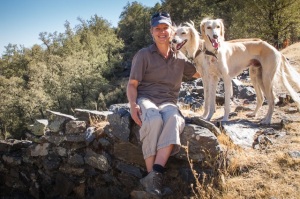
~Biocadence: How do you refuel your spirit, energy, and optimism?
Sietske: I read, listen to music, go for walks with our dogs, ride my horse, enjoy nature, and chat with my husband, friends and family.
~Biocadence: If you could change one thing about humanity, what would it be?
Sietske: I would like to remove the importance of religion.
~Biocadence: What sustainable living behaviors did you grow up with?
Sietske: To be aware of the use of water and electricity and we never used to eat much meat because it was too expensive to eat daily.
~Biocadence: What sustainable living transitions have you incorporated into your lifestyle?
Sietske: We live off grid and I try as much as I can to purchase local products (food and non-food).
~Biocadence: How do your sustainable living practices impact your quality of life?
Sietske: It is very liberating to know that you will not receive a bill at the end of the month for your water and electricity consumption. It is amazing to know that you are not registered as a consumer of this anywhere, so ‘big brother’ can’t watch that aspect of your life and it is fantastic to realise with everything you do how much electricity you use (with solar panels you have to keep an eye on the status of your electricity before you use your washing machine for example).
~Biocadence: Why do you engage in sustainable living?
Sietske: I have lived in cities, worked for bosses, saved for holidays and done just that what everyone else does because you are expected to do so…. that was fun but as I grew older I wanted different things in life. I also wanted to try and make my dreams come true. One of my dreams was to have my horses close to home (i.e. on the land next to the house), have a few dogs (was not possible in the city) and live closer to nature, away from the stress and hastiness of the city. Only when I stopped being busy leading a life that wasn’t what I wanted, dreamt of or desired… only then did my life open up… it became richer: I read more, listen to music again; I have the time to be inspired and the courage to make changes.
~Biocadence: Who are your role models? Why?
Sietske: I don’t have a role model, because I believe in making your life the best you can for you and those you love: ‘Life has no remote, get up and change it yourself!’ I do have favorite writers and poets, one of them is Khalil Gibran. He wrote: ‘If you love somebody, let them go, for if they return, they were always yours – & if they don’t, they never were’. This is also so true…. When asked: ‘what about humanity surprises you the most’ the Dalai Lama answered:
‘Man, because he sacrifices his health to make money, then sacrifices his money to recuperate his health, he then is so anxious about the future that he doesn’t enjoy the present. As a result he doesn’t live in the present or the future and he lives as if he’s never going to die. Then he dies having never really lived.’
~Biocadence: What estimates do you have about the state of global affairs, 50 years in the future?
Sietske: I don’t believe the future of the world looks good. Without management of populations (which is a taboo subject apparently) the world population will spiral out of control which will result in wars over basic needs such as food and water. Furthermore the continuous economic growth that every country aspires to is unsustainable, as well as traditional agriculture and the way the banking industry is organised at the moment. This will have to change but I don’t believe politicians are necessarily concerned with what is best for you and me. Politics are run by the large corporations around the world who are not necessarily worried about the wellbeing of the people of the world.
~Biocadence: When you are seeking answers, where do you go? Books and quotes by  subject matter mentors? Exercise? Nature? Silence? Discussion with friends and family? Meditation and/or prayer? When you’ve reached your answer(s) and look back on the experience, what pleases you most: the solution you found, or the process that got you there?
subject matter mentors? Exercise? Nature? Silence? Discussion with friends and family? Meditation and/or prayer? When you’ve reached your answer(s) and look back on the experience, what pleases you most: the solution you found, or the process that got you there?
Sietske: I read, I discuss, I listen and take in. There is not one fix for the questions we have so I do all of the above except for pray. The process is always worth more than the answer because in the process you discover new things, about yourself and others, and in the process much more than that one question got answered.
~Biocadence: What does the verb “to enjoy” mean to you?
Sietske: Live life fully, enjoy what you do because it is too short to be miserable. Forget your troubles and enjoy what you have.
~Biocadence: Do you remember a moment when you mastered “enjoyment”? When… where… what were you doing? And, what made it so?
Sietske: There have been many: sledding with huskies in Svalbard was the ultimate enjoyment of silence / riding my horse is the ultimate enjoyment of feeling connected with an animal / but also smaller and more ‘daily’ things such as eating delicious food, drinking wonderful wine / a kiss from your loved one, etc.
I asked Sietske if she’d like to feature a link to an organization that has impacted her positively. She offers www.populationmatters.org, as their website is excellent, with a wealth of information.
I hope you’ve enjoyed reading about Sietske’s off grid sustainable living adventure, as much as I have!!!
Until next week,
Annie
–
Quicklinks to Most Popular Biocadence Articles:
“The Hunger Games”… Fiction or Non-Fiction?
What is Ethical Eating?… Is Eating Meat Ethical?
Related articles
- GoGreen Expands to Current Affairs and Green News (prweb.com)
- Two-Week Permaculture Design Course at Alderleaf – Learn Sustainable Living Skills and Earn an Internationally-Recognized Certificate for Sustainability Consulting! (prweb.com)
- Gamefied Sustainable Living Apps – Practically Green Provides Simple and Personalized Green Tips (TrendHunter.com) (trendhunter.com)
